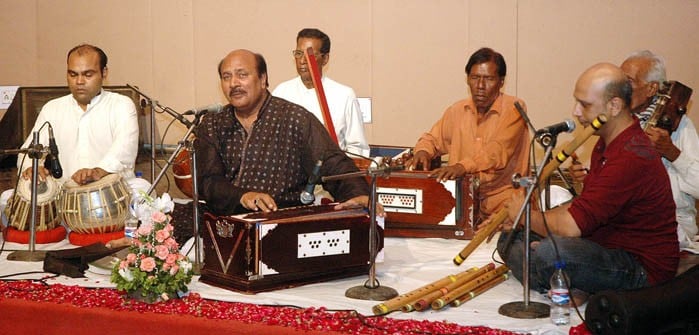
A two day music festival held at Alhamra to strengthen the link between contemporary and classical forms

Carvan organised a two day festival of music at the Alhamra last week titled, ‘Kheyal Say Ghazal Tak’ in which many leading exponents of various musical vocal forms participated. The festival was to be held on two consecutive days but, due to the death of Dr Javed Iqbal, Alhamra had to be shut down for a couple of days as a mark of respect. The second day of the festival was held after a gap of two days.
Run by Afaq Hussain, an indefatigable roadrunner of the cause of classical and other serious forms of music in the country, Carvan has been doing its bit for the promotion of music. Formed a couple of decades ago, it has pulled along by holding programmes which may not have been very regularly held. The institution has survived mainly due to the untiring efforts of Afaq Hussain who pulls out a trick or two from his bag to meet the financial requirements of organising such an effort.
The chairman of the organisation, Dr Ashfaq Ahmed has one of the largest collections of music -- particularly classical music (both instrumental and vocal) in the country, and is well-versed with the multiple intricacies and finer aspects of the various forms. Low key and of a retiring temperament (a welcome break from a culture that encourages an upfront and in-your-face attitude), he has been a source of inspiration to serious followers of music and has never let them down in offering his archives or his advice.
The two of them have been concerned about the state of music in the country and one opportunity that offers itself is to analyse the varying traits that make up the rapidly-changing musical requirements and tastes. One approach often taken is to establish a link between the classical forms like the kheyal and the current popular forms that are being heard endlessly these days. Taking this road, it seems the change or changes are not really that much or that great.
Attempts have been made in the last fifty odd years since the cleavage started to develop, and the popular forms besides being popular also started to gain in stature, to establish a link between the classical and the popular forms. Raag Say Ghazal Tak was one such title given to a number of recordings meant to establish the link.
The current one -- Kheyal Say Ghazal Tak - seems to be an effort in the same direction. As film music became very popular by the 1940s, the first attempts were to decipher the film songs according to the bandishes in the various raags. Quite a few were either simplified song versions or adaptations of the more complex kheyal compositions; some were renditions of the thumri numbers that had become popular by the late nineteenth and early twentieth century, while some were a variation on the kheyal bandishes which a trained ear could pick with a little bit of concentration.
It was much later as the base of our popular music moved away from the raag-oriented music that new difficulties of another kind were encountered.
A large number of students and young performers took part in the festival but there were more seasoned ones like Saima Jahan, Muzaffar Chaudhry and Afshaan Seemen. Among the more renowned performers were Salman Amjad, Amanat Ali Khan, Shafqat Salamat Ali Khan, Qadir Shaggan and Muhammed Muslim. Shafqat Salamat Ali Khan has the potential and experience and when he performs with restraint and concentrates on the development of the musical idea within the raag structure, he is very good. But at times he is pushed by the audiences towards an overt display of his craft. That brings in lots of instant accolades but does not help much to foster music itself. In the festival, he sang very well and exercised the relevant restraint without overstepping the line. Muhammed Muslim is being groomed through the difficult process of initiation by his uncle and other members of the family. He shows great promise and it is hoped that he stays on course and successfully pitches the kheyal gaiki particular to his gharana into contemporary times. He is well-aware of the dos and donts of following the traditional forms of music -- in particular the kheyal. Ghulam Hasan Shaggan sang most of the bandishes in taal ikwai. It was apparent that playing that taal too is becoming a rarity and one of the possible challenges that he may be facing in future with the diminishing number of accompanists that he may have to encounter.
Among the ghazal exponents were Ghulam Abbas, Ali Raza and Aqil Manzoor, and both of them sang some new numbers while the demand and the pressure from the audience was great for them to sing the numbers which have become popular.
Carvan Awards were also given to the famous vocalists and instrumentalists. Instrumentalists have stayed a step behind and have been largely unnoticed in the capacity of being accompanists. Though seen and heard in all functions/programmes, their names are generally not known to the people nor their talent fully appreciated. Their role in establishing the ambience of the melody is more critical than is generally acknowledged. Among these musicians were Muhammed Aslam on the harmonium and Faqir Hussain on the sarangi, both very old and in the twilight years of their lives, but Baqir Abbas on the bansuri is quite young and many years of playing the bansuri are ahead of him. He has got immense talent and has been working very hard on his music. He is often heard and seen playing preludes and interval pieces in popular programmes of music. It is about time that he started to play the bansuri as a solo instrument to bring out the full potential that he has in plenty.